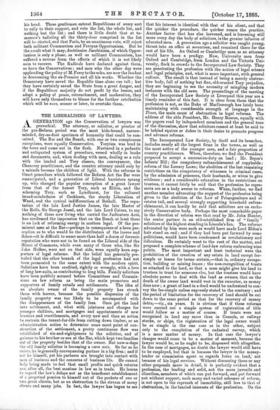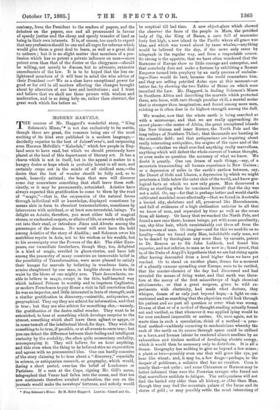THE LIBERALISING OF LAW YhRS.
AGENERATION ago the Conservatism of lawyers was proverbial. The attorney, or solicitor, or proctor of the pre-Reform period was the most hide-bound, narrow- minded, dry-as-dust specimen of humanity that could be con- ceived. The Bar and the Bench, with one or two conspicuous exceptions, were equally Conservative. Toryism was bred in the bone and came out in the flesh. Nurtured in a pedantic and antiquated system of procedure, versed wholly in books and documents, and, when dealing with men, dealing as a rule with the landed and Tory classes, the conveyancer, the Chancery practitioner, and the country attorney could only by a miracle become the children of light. With the reforms in Court procedure which followed the Reform Act the Bar were emancipated, and a generation of Liberal barristers sprang up, who changed the popular conception of a great lawyer from that of the honest Tory, such as Eldon, and the scheming Tory, such as Lyndhurst, for the cultured broad-mindedness of Cockburn, the sturdy Liberalism of Wood, and the cynical indifferentism of Bethell. The repu- tation of the late Lord Justice James, the late Master of the Rolls, Sir George Jesael, and the late Lord Cairns, to say nothing of those now living who carried the Judicature Acts, has confirmed the impression that on the Bench at least there is no lack of reforming energy in matters legal. Of the pro- minent men at the Bar—perhaps in consequence of a keen per- ception as to who would be the distributors of the loaves and fishes—it is difficult to name more than half a dozen of forensic reputation who were not to be found on the Liberal side of the House of Commons, while even many of those who, like Sir John Holker, were not on that side, were equally keen sup- porters of legal reforms. But the belief has generally pre- vailed that the other branch of the legal profession had not been permeated to the same extent with the modern spirit. Solicitors have been credited, rightly or wrongly, with a love of long law-suits, as contributing to long bills. Family solicitors have been publicly accused before Committees and Commis- sions on law reform as being the main promoters and supporters of family entails and settlements. The idea of an absolute owner of the family property has struck them with horror, because the possible dispersion of the family property was too likely to be accompanied with the disappearance of the family fees. Once get the land into settlement, and, what with jointures and charges for younger children, and mortgages and appointments of new trustees and resettlements, and every now and then an action to restrain the tenant-for-life from cutting down timber, or an administration action to determine some moot point of con- struction of the settlement, a pretty continuous flow was established of six-and-eightpences to the solicitor, and of guineas to his brother or son at the Bar, which kept two families out of the property besides that of the owner. But now-a-days the old family solicitor is becoming a rara avis. So far as he exists, he is generally conveyancing partner in a big firm ; and if not he himself, yet his partners are brought into contact with men of business and the concerns of business life. He cannot help being made to feel that small profits and quick returns are, after all, the best maxims in law as in trade. He learns to regazd the law's delays not as the beneficent establishment of a perpetual pension to himself out of the pockets of one or two great clients, but as an obstruction to the stream of many clients and many jobs. In fact, the lawyer has begun to see that his interest is identical with that of his client, and that the quicker the procedure, the quicker comes the practice. Another factor that has also leavened, and is leavening still more every day the body of solicitors, is the greater infusion of educated men. A generation ago a solicitor was caught young, thrust into an office at seventeen, and remained there for the rest of his life. An Oxford or Cambridge man as an attorney would have been a prodigy. Now, University men from Oxford and Cambridge, from London and the Victoria Uni- versity, flock in crowds to the Incorporated Law Society. They are penetrating the profession with the notion of legal science and legal principles, and, what is more important, with general culture. The result is that instead of being a merely obstruc- tive body, full of nothing but fine, old-crusted Tory prejudice, they are beginning to see the necessity of mingling modern instances with the old saws. The proceedings of the meeting of the Incorporated Law Society at Liverpool this year are a timely reminder of this fact. It is clear from them that the profession is not, as the Duke of Marlborough has lately been maintaining with considerable strength of language in the Times, the main cause of obstruction in legal reforms. The address of the able President, Mr. Henry Roscoe, equally with the papers read by independent members and the general tone of the discussion, show that solicitors cannot at least be said to be behind squires or dukes in their desire to promote progress and advance reforms.
The Incorporated Law Society, by itself and its branches, includes nearly all the largest firms in the towns, as well as the most active of the younger men, and a fair proportion of country practitioners. When, therefore, we find the President prepared to accept a succession-duty on land ; Mr. Bryce's Infants' Bill ; the compulsory enfranchisement of copyholds ; reform of the Lunacy Laws; the abolition of the last remaining restrictions on the competency of witnesses in criminal cases, by the admission of prisoners, their husbands, or wives to give evidence ; and a considerable relaxation in the restrictions on trustees, it cannot fairly be said that the profession he repre- sents are as a body averse to reforms. When, further, we find another member advocating the support of the profession being given to the abolition of the Law of Primogeniture and of estates tail, and several strongly supporting leasehold enfran- chisement, it can hardly be said that solicitors are an exclu- sively Conservative body. Perhaps the most remarkable paper in the direction of reform was that read by Mr. John Hunter, the senior partner in an old-established firm of "family " solicitors of the highest standing in Lincoln's Inn. The reforms advocated by him were such as would have made Lord Eldon's hair stand on end ; and if they had been put forward by some politicians, would have been condemned as revolutionary and ridiculous. He certainly went to the root of the matter, and proposed a complete scheme of land-law reform embracing nine points. The most important and least technical were the prohibition of the creation of any estate in land except fee- simple or leases for terms certain,—that is, ordinary occupa- tion, building or mining leases ; the non-recognition of trusts as attached to the land, so that a man might give his land to trustees in trust for someone else, but the trustees would have absolute power to deal with the land as owners, that on the death of the owner land would vest in the executor, as money does now ; a grant of land in a deed would be understood to con- vey the fee-simple unless expressly stated to the contrary ; and the period of limitation for the recovery of land should be cut down to the same period as that for the recovery of money debts,—viz., six years. It is obvious that if these reforms were carried out a simple system of registration of title would follow as a matter of course. If trusts were not recognised in land any more than in Consols, or railway stocks, or ships, the registration of the legal owner would be as simple in the one case as in the other, subject only to the completion of the cadastral survey, which is a mere matter of money. In that case the lawyer's charges would cease to be a matter of moment, because the lawyer would be, as he ought to be, dispensed with altogether. In the case of mortgages, no doubt the lawyer would still have to be employed, but that is because the lawyer is the money- lender or commission agent as regards loans on land; not because of his legal services. Without discussing these or any other proposals more in detail, it is perfectly evident that a profession, the leading and solid, not the mere juvenile and clientless, members of which can put forward, and put forward not without support, such many and varied schemes of reform, is not open to the reproaoh of immobility, still less to that of obstruction, in the fancied interests of the profession. On the contrary, from the President to the readers of papers, and the debaters on the papers, one and all pronounced in favour of speedy justice and the cheap and speedy transfer of land as being in their own interests. It is, of course, too much to expect that any profession should be one and all eager for reforms which would give them a great deal to learn, as well as a great deal to unlearn ; but it is no slight matter that members of a pro- fession which has so potent a private influence on man—more potent even than that of the doctor or the clergyman—should be willing, not merely to discuss, but to advocate, extensive amendments of the law. It is to be hoped that the less en- lightened members of it will bear in mind the wise advice of their President :—" We as a class have exceptional power for good or for evil in all matters affecting the changes brought about by alteration of our laws and institutions ; and I trust and believe that we shall use those powers with wisdom and Moderation, and in so doing help on, rather than obstruct, the great work which lies before us."



































 Previous page
Previous page